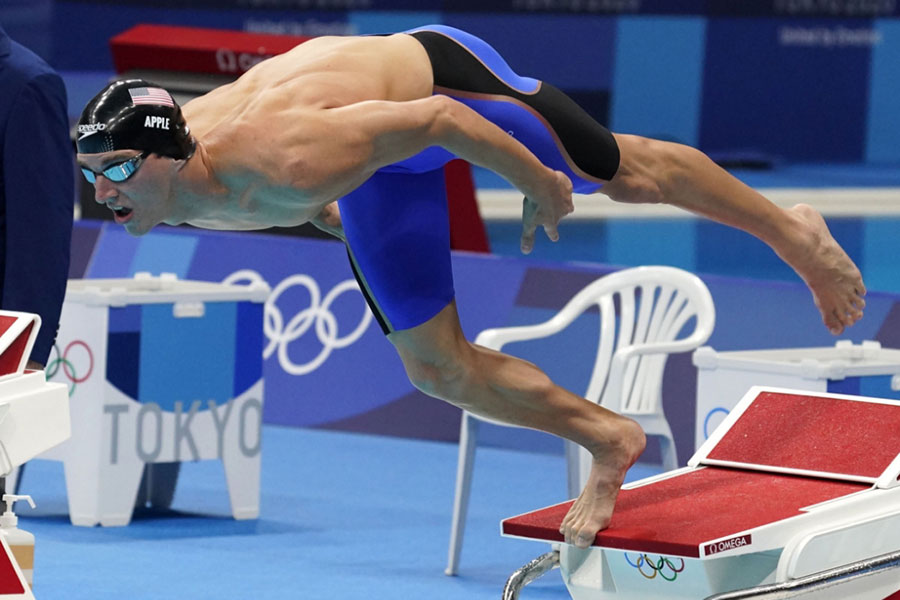Indiana University has a long history of producing Olympic athletes: Our alma mater has been represented at the Olympic Games dating all the way back to 1904 when LeRoy Samse (class of 1906) and Thad Shideler (class of 1907), both men’s track and field athletes for Team USA, competed in St. Louis and won two silver medals.
Since then, IU’s world-class athletes have collectively represented more than 20 countries and earned more than 100 medals in sports such as swimming and diving, basketball, and soccer.
These are the alumni who have won Olympic gold.
In 1932, track and field athlete Ivan Fuqua, BS’35, simultaneously became IU’s first Olympic gold medalist and a world record holder as a member of the U.S. men’s 1,600 relay team. After his athletic career ended, Fuqua spent 27 years coaching track at Brown University.
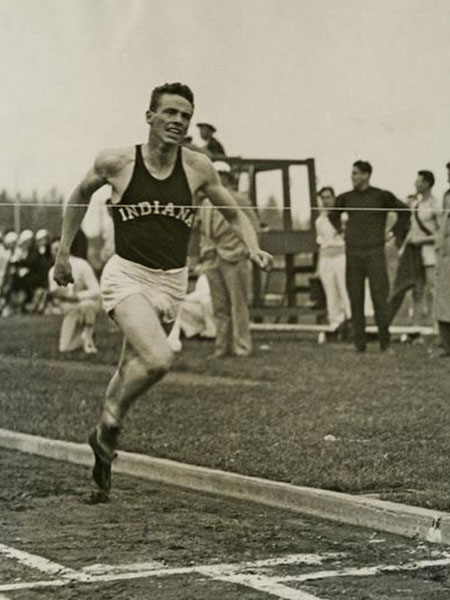
Roy Cochran, BA’42, earned his way into the U.S. Track and Field Hall of Fame as a two-time Olympic gold medalist. At the 1949 London Olympics, Cochran won the 400 hurdles and was a member of the winning 1,600 relay team. He also earned a spot on the 1940 Olympic team, but the Games were canceled because of World War II.
Swimmer Bill Woolsey, ’57, competed in a handful of events between his two Olympic appearances—1,500 freestyle, 400 backstroke, 100 freestyle—but he brought home the gold as a member of the U.S. men’s 800 freestyle relay team at the 1952 Finland Games.
While a sophomore at IU, long jumper Gregory Bell, DDS’61, leaped his way to a gold medal at the 1956 Melbourne Olympic Games with a 25 foot, 8.27 inch jump. But that wasn’t his best performance—by the end of his career, Bell had more than a dozen jumps over 26 feet.
Michael Troy, BS’64, secured gold twice at the 1960 Rome Olympic Games—the first to be televised in its entirety. His first-place finish in the 800 freestyle relay and the 200 butterfly swim came at the beginning of his decorated college career.
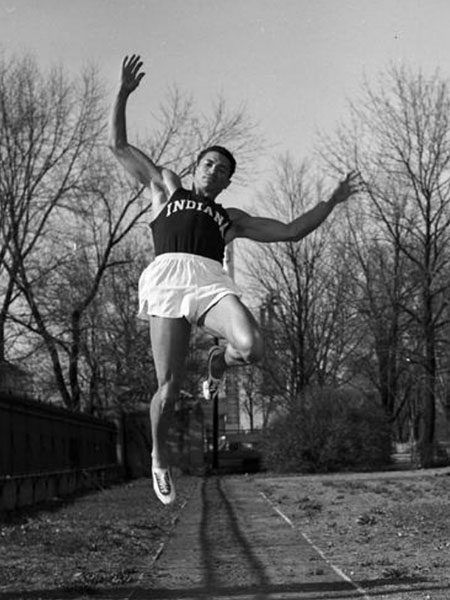
Two-time Olympic swimmer Frank McKinney Jr., BS’61, MBA’62, LLD’70, struck gold with his first-place finish in the 400 relay at the 1960 Rome Olympic Games. McKinney also competed in the 1956 Melbourne Games.
Walter Bellamy Jr., BS’71, was a member of the gold medal 1960 U.S. men’s basketball Olympic team. He went on to become IU’s first No. 1 overall pick in the NBA draft and a NBA Hall of Famer.
International swimming hall of famer Bob Windle, BS’69, represented Australia in the 1964 and 1968 Olympic Games, winning gold in the 1,500 freestyle in the former. Windle is Australia’s sole male Olympic swimmer to compete in every freestyle distance.
Before a decorated college career—two Big Ten titles and five NCAA titles—Ken Sitzberger, BS’68, won gold for the U.S. in springboard diving at the 1964 Tokyo Olympic Games.
The 1964 U.S. 400 medley relay team—including Fred Schmidt, BA’65—not only swam to gold but also set a world record time of 3:58.4.
Swimmer Kathleen Ellis Landgraf, BSN’69, was the first IU woman to earn Olympic gold, and she did it two times over. Landgraf finished first in the 400 freestyle and the 400 medley relay at the 1964 Tokyo Games.
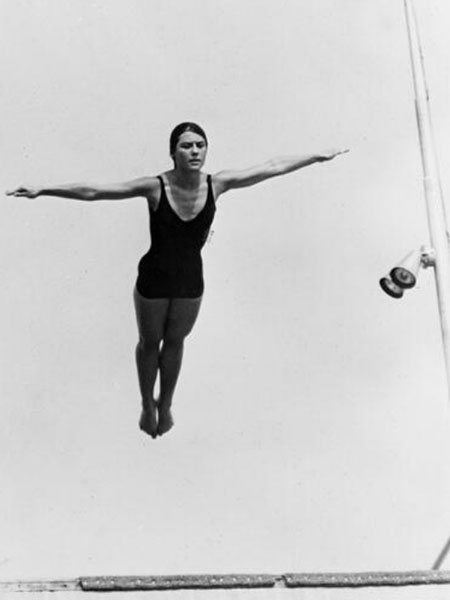
Lesley Bush, BA’70, earned gold for the U.S. in platform diving at the 1964 Tokyo Games. No American woman has won gold in 10 meter diving since. Bush also competed in the 1968 Mexico City Olympics and served as an alternate in the 1972 Munich Games.
In his second Olympic appearance at the 1964 Tokyo Games, (he was only 15 years old the first time he competed at the 1960 Rome Games), Kevin Berry, ’67, beat his own world record and took first place in the 200 butterfly swim.
Former world, Olympic, and American swimming record holder, Don McKenzie, BS’71, won two Olympic gold medals while he was an IU student. He placed first in the 100 breaststroke and as a member of the 400 medley relay team at the 1968 Mexico City Games.
Charles Hickcox, BS’70, swam to gold in three of the four events he competed in at the 1968 Mexico City Games—the 400 medley relay, 400 individual medley, and the 200 individual medley.
Amid his collegiate swimming career—during which he received All-American honors 15 times— Fred Tyler, BS’77, helped Team USA to an 800 freestyle relay gold medal at the 1972 Munich Games.
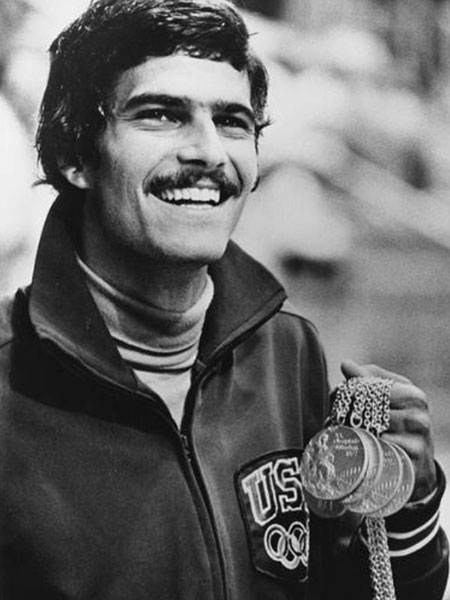
Michael Stamm’s 1972 Munich Olympic gold medal in the 400 medley relay came at the peak of his impressive IU swimming career. Stamm, ’75, recorded 11 Big Ten victories and two NCAA championship wins.
It took 36 years for an athlete to surpass swimmer Mark Spitz’s record of seven Olympic gold medals won in a single Olympics (Fun fact: It was Michael Phelps). Spitz, ’72, won gold nine times—twice at the 1968 Mexico City Games and seven times in Munich in 1972.
Skilled at both the backstroke and freestyle swim, John Murphy, BS’76, won gold in the latter as a member of the winning 400 freestyle relay team at the 1972 Munich Olympics.
Former American record holder (500 and 1,650 freestyles) John Kinsella, BS’74, won a gold medal with the 800 freestyle relay team at the 1972 Munich Olympics.
Dubbed the “world’s fastest swimmer” in 1976, Jim Montgomery, BS’77, won triple gold at the Montreal Olympic Games that year in the 100 freestyle, 400 medley relay, and 800 medley relay.
All-American and collegiate player of the year, Scott May, BS’76, set an IU scoring season record with 752 points and won an NCAA championship with IU’s men’s basketball team in 1976. That same year, he won gold with the Olympic U.S. men’s basketball team in Montreal.
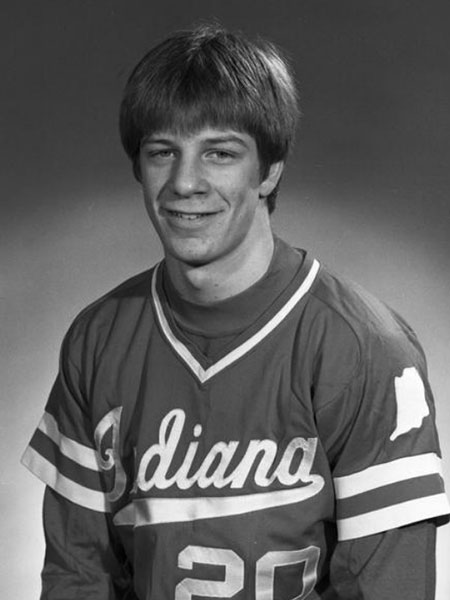
Quinn Buckner, BS’76, captained the 1976 Montreal Olympics U.S. men’s basketball team. Buckner’s gold medal places him in an elite club of only three people to win high school, college, Olympic, and NBA championships.
Australian swimmer Mark Kerry, ’81, found success in 1980 at his second Olympic Games in Moscow when his 400 medley relay squad placed first.
1984 was a big year for Sunder Nix, BA’86. The sprinter was named IU Athlete of the Year, Big Ten Athlete of the Year, and he ran a leg on the gold medal-winning 4x400 men’s relay team at the Los Angeles Olympics.
IU men’s basketball’s four-time MVP and second-leading scorer, Steve Alford, BS’87, took his talents to the international stage in 1984 as a member of the U.S. Olympic gold medal team coached by Bob Knight.
At the 1988 Seoul Games, Michael “Mickey” Morandini, ’88, became IU’s only baseball Olympic gold medalist. Morandini went on to spend eleven seasons playing professional baseball. He played second base for the Philadelphia Phillies, the Chicago Cubs, and the Toronto Blue Jays.
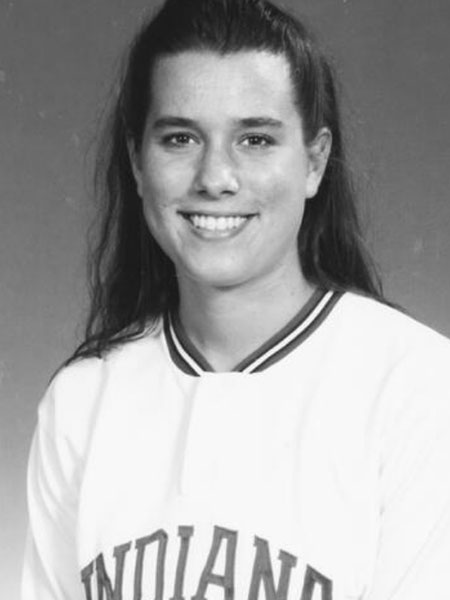
Mark Lenzi, BGS’90, BA’97, became an Olympic gold medalist in three diving at the 1992 Barcelona games—the same event in which he won a Big Ten championship three years prior.
Former IU standout Tara VanDerveer, BA’75, the winningest basketball coach in NCAA history, coached the U.S. Olympic women’s basketball team to gold at the 1996 Games in Atlanta. VanDerveer’s coaching accomplishments earned her a spot in the Naismith Memorial Basketball Hall of Fame.
Michelle Venturella, BS’96, IU’s sole softball Olympic gold medalist, was a member of Team USA for six years after graduation. She won a gold medal at the 2000 Sydney Olympics.
Six-time Big Ten track and field champion and five-time NCAA All-American David Neville, BM’07, became the first IU alum in 24 years to win gold in the 4x400 relay team at the 2008 Beijing games.
Blake Pieroni, BS’19, became IU’s first Olympic gold medalist swimmer in 36 years when he swam a leg of the 4x100 freestyle relay at the 2016 Rio de Janeiro Games. Pieroni once again brought home gold in the 4x100 freestyle relay and the 4x100 medley relay in the pandemic-delayed 2020 Tokyo Games.
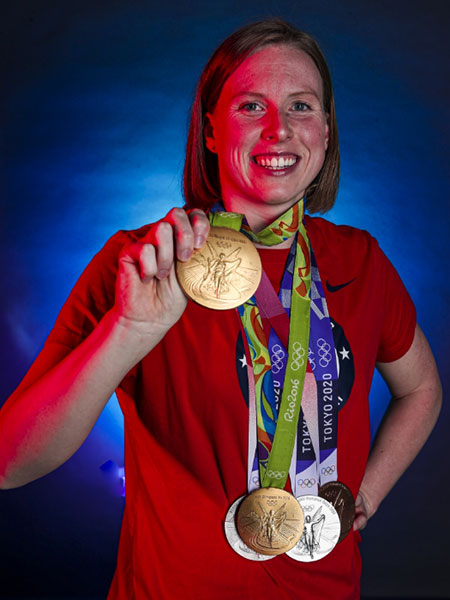
On his third attempt to make the U.S. Olympic swimming team, Cody Miller, BS’15, not only earned a spot on the 2016 Rio de Janeiro team, but he also won gold in the 4x100 medley relay.
Lilly King’s Olympic swimming achievements are best explained by the numbers: Two Olympic Games appearances, seven events, six medals, and two first-place finishes. King, BS’19, won both gold medals at the 2016 Rio de Janiero Games with an individual title in the 200 breaststroke and a team title in the 4x100 medley relay.
Canada’s Derek Drouin, BS’13, leaped 7 feet, 9.7 inches to gold in the high jump at the Rio de Janeiro Games in 2016 with his unique bounding versus running approach.
Zach Apple, BS’19, and the Hoosier-dominated 4x100 freestyle relay and 4x100 medley swim relay teams brought home two gold medals at the 2020 Tokyo Games.
